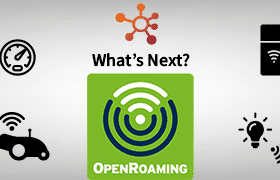Why Enterprise VPNs Are So Important but Challenging for IoT CSPs
In the rapidly evolving world of the Internet of Things (IoT), ensuring the security and reliability of connected devices is paramount. As more enterprises deploy IoT solutions to streamline operations, enhance efficiency, and drive innovation, robust network security and management become critical. This is where the Enterprise Virtual Private Network (VPN) plays a crucial role in cellular IoT deployments. It is needed when an IoT CSP wants to provide a private connection (Private APN) to customers.
What is a Private APN?
A Private APN is a unique identifier that allows devices to connect to a specific, private part of a mobile network. Unlike public APNs, which provide access to the general internet, Private APNs offer a dedicated connection path for devices within an enterprise’s network. This dedicated path ensures that the data traffic is isolated from the public internet, enhancing security and performance.
A Private APN is created by setting up an Enterprise VPN between the Packet Gateway in the mobile core and the Enterprise network. All traffic for the Private APN is then routed to this Enterprise VPN.
It’s important to note the distinction between client VPN and Enterprise VPN. Many IoT devices cannot act as VPN clients, making an Enterprise VPN essential for security. However, VPN client-capable devices can run an end-to-end client-to-server VPN within an Enterprise VPN. This would, however, be unnecessary, as communication is already protected by the integrity of the cellular radio network.
The Role of Enterprise VPNs in Cellular IoT
Enterprise VPNs create secure, encrypted connections over public networks, providing a secure communication channel for data transmission. When combined with APNs to create Private APNs, enterprise VPNs offer a powerful solution for managing and securing cellular IoT deployments. Here are the main reasons why they are essential:
1. Enhanced Security
IoT Security is a top concern for IoT deployments, given the data sensitivity and pure volume of headless IoT devices, which make it difficult to detect anomalies. A Private APN, coupled with an Enterprise VPN, ensures that data traffic is routed through a secure, private network, minimizing the risk of unauthorized access, data breaches, and cyber-attacks. The encryption provided by VPNs further protects data integrity and confidentiality.
2. Improved Network Performance and Reliability
By using a Private APN, enterprises can ensure that their IoT devices are connected to a dedicated network segment, reducing congestion and improving performance. This dedicated connection minimizes latency and packet loss, leading to more reliable and consistent communication between IoT devices and central systems.
3. Regulatory Compliance
Specific industries, such as healthcare and finance, are subject to strict regulatory requirements regarding data privacy and security. Private APNs and VPNs help enterprises comply with these regulations by providing secure, controlled access to the network and ensuring that sensitive data is transmitted in a compliant manner.
4. Cost Efficiency
While the initial setup of Private APNs and VPNs may involve investment, the long-term benefits of security, performance, and management efficiency can lead to significant cost savings. Reducing the risk of data breaches and downtime can save enterprises considerable money and protect their reputation.
Real-World Applications
Several industries are already leveraging the benefits of Private APNs and Enterprise VPNs for their IoT deployments. Here are a few examples:
- Smart Cities: Secure and reliable connectivity is essential for managing public infrastructure, such as traffic lights, surveillance cameras, and public transportation systems.
- Industrial Automation: Manufacturing plants rely on real-time data from connected sensors and machinery to optimize production processes and ensure safety.
- Healthcare: Medical devices and remote patient monitoring systems require secure communication channels to protect sensitive patient data and comply with regulations.
- Agriculture: IoT devices used in precision farming, such as soil sensors and irrigation systems, depend on reliable connectivity to maximize crop yields and resource efficiency.
Why IoT Enterprise VPNs Are So Challenging
Using Enterprise VPNs can be very challenging for both IoT CSPs and their Enterprise customers. First, setting up an Enterprise VPN (IPsec) is generally a manual process involving IT engineers on both sides. This can take weeks to complete.
Second, when the enterprise customer wants to route traffic for a range of devices to another Private APN, they must repeat the lengthy process of setting up another Enterprise VPN and updating the Private APN setting in each device.
This does not scale! Which is terrible news for IoT with thousands, maybe millions of devices.
Enea IoT CCS Is Coming to the Rescue

With the IoT CCS’s award-winning Multitenancy Private APN functionality, the IoT CSP only uses one APN that is routed through an IPSec tunnel to their instance of IoT CCS. IoT CCS will then split the traffic into the different Enterprise VPNs. Best of all, the IoT CSP can automate the Enterprise VPN setup by allowing the enterprise customer to do the setup themselves through the IoT CSP’s customer self-service portal.
This solves both challenges. Enterprise customers can set up as many Enterprise VPNs as they need in minutes rather than weeks. When they want to move a range of devices to a new Enterprise VPN, the Private APN does not need to be reconfigured in the device, as they will use the same shared APN.
Another benefit of IoT CCS is that all traffic is secured by a stateful firewall that is configurable to the enterprise customer’s settings. So, if the customer does not want to go with an Enterprise VPN from day one, at least the firewall will secure them. Moving into an Enterprise VPN later is a smooth and straightforward step.
Conclusion
As IoT continues to transform industries, the importance of secure and reliable network connectivity cannot be overstated. Enterprise VPNs, particularly when combined with APNs to create Private APNs, provide a comprehensive solution for enhancing the security and performance of cellular IoT deployments. By investing in these technologies, enterprises can ensure the success and sustainability of their IoT initiatives, paving the way for innovation and growth in the connected world.
However, to scale their businesses, IoT CSPs must challenge the traditional Enterprise VPN deployment model and add automation through an IoT Connectivity Control Function (ICCF) such as Enea IoT CCS, which works in concert with their Connectivity Management Platform (CMP).




